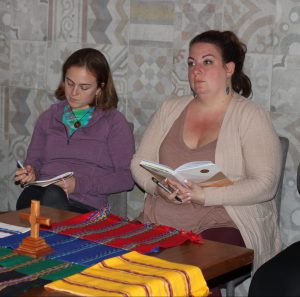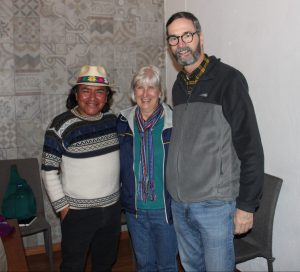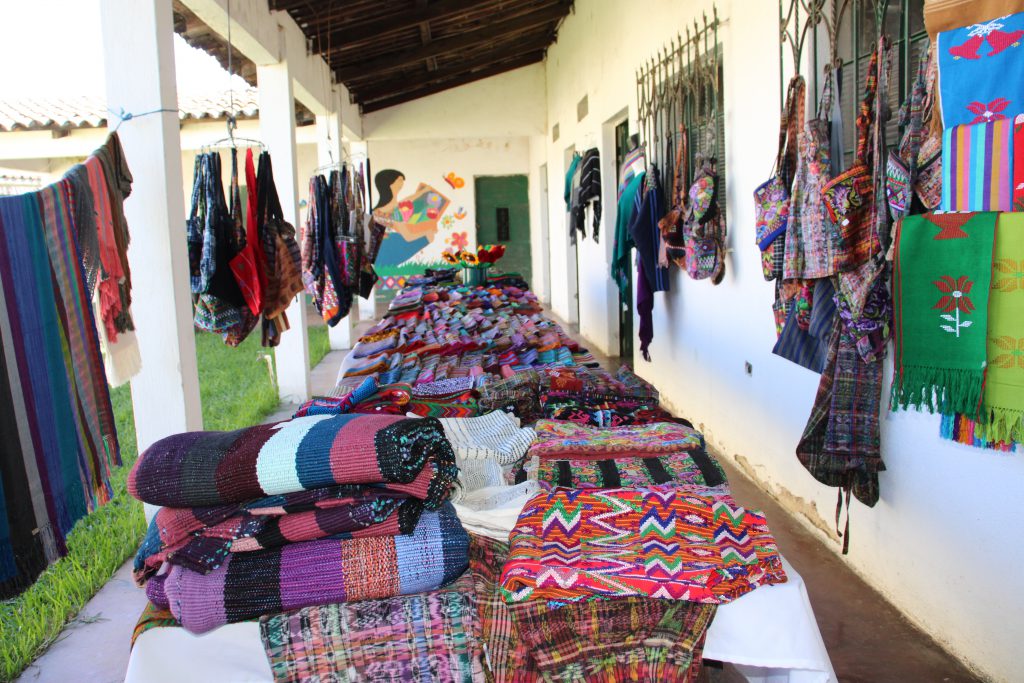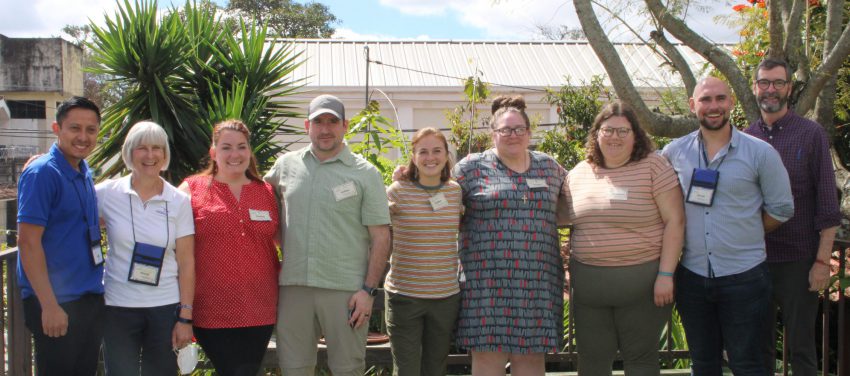Pittsburgh Theological Seminary’s curriculum includes a required intercultural learning trip to help students see their own ministry with new eyes by stepping outside their context. These trips are part of the “Intercultural/Experiential Learning” course (MI310) offered by the Seminary every January Term, organized by the World Mission Initiative. The course provides pre- and post-experience orientation and reflection in cultural proficiency and anti-racism, intercultural communication, a theology of short-term mission engagement, area studies for the specific context to be studied, and spiritual practices for mission.
The January 2023 trips were to Lebanon, the Philippines, Guatemala, and Israel/Palestine. Excerpts from student reflection journals will be shared on the blog throughout the month.
Intercultural Trip to Guatemala
Journal Author: Caroline Baker
Jan. 8, 2023
Guatemala City, Guatemala
An encouraging thing I learned today, via a horrific story: In 2017 there was the tragedy of the Fuego del Hogar Seguro Virgen de la Asunción during which 41 girls died. As a result of tragedies and traumas in their individual lives, girls were sent to be “protected” in this government safe home. Unfortunately, due to corruption, there was little safety or protection provided them. In an attempt to coerce the leaders into better care, the girls protested slightly. This didn’t go well and after not being given attention they set a small fire in a classroom hoping it would get the attention of the leaders and hold them accountable. The opposite happened. The girls were locked in the classroom and 41 of the 56 young girls died in the fire. This story is sickening and tragic and evil and the result of corruption and power dynamics. This story is terrifying because it just happened six years ago. This story is infuriating because it is only one of so many like it.
There is a painted rainbow circle with crosses and a plaque in the public park/town square as a memorial to the girls and a reminder of the tragedy at the hands of the state. And it is not a conspiracy theory nor a “hush hush” thing that this was the government’s fault. The sign itself reads, “We will not forget. It was the state.”
There is public outcry to the corruption and a refusal to dance around the accusation or blame. And yet, this memorial receives constant violence and destruction. At one point in time there were metal crosses with names inscribed: one for each girl who was murdered. Now there are wooden crosses cemented into flower pots, the name tags removed, and nearly half as many crosses as girls who died. Crosses have been broken and stolen. The original plaque, though metal and very difficult to break, was smashed and cracked and had to be replaced. People are angry and defending the government, or at least trying to shut up the people speaking out. And yet people keep speaking out.
The amazing piece of this story—the encouraging thing I learned—is that no church, humanitarian program, or organized group made the memorial or protects it. It is all women. Women created and built the memorial. Women repair and keep up the memorial. Women show up every Friday to protest and be visibly present. Women!

The power of women standing up, showing up, speaking up, and fighting back has kept the memory of the girls and the reminder of the corruption alive and in the forefront of people’s minds. We may be oppressed, but we are mighty. One of our hosts says all the social justice work happening in Guatemala is backed and influenced by women. The Protestant and Catholic churches bash heads on everything except the oppression of women. On this matter they join together and find it within themselves to team up and keep women down.
Perhaps I am too jaded. Perhaps I have discovered the truth of the inner workings of the patriarchy. Either way, I have been inspired once more by the beautiful, life-changing strength of women to bring healing and justice to this world. I feel angry and hurt on behalf of the families who lost a loved one in this fire, and I feel encouraged to speak up myself when I know something is not right or someone needs to be defended.
Jan. 12, 2023
Quetzaltenango (Xela), Guatemala
Today we heard Samuel’s [not his real name] story. Yesterday at lunch he and I were talking in Spanish and he told me they couldn’t go back to the United States because he had been deported. I hadn’t even known he’d immigrated. I’m not sure if this was something I missed or forgot from early conversations or if he intentionally kept a low profile about it for a while. We talked about it a little but I didn’t want to press too much and also I didn’t want to miss important details because we were talking in Spanish. Tonight, Hunter asked him to share his story with the group during our reflection time. He gave us the full story and calmly shared his immigration experience, though it seems there was nothing calm about it.
In 1996 his dad died, and by 2002 his mother decided to go to the Unites States to be with her oldest son, who had been living there over a decade. Samuel recalled every date of this journey to and from the states. On Sept. 15, 2002, he and his mother started the journey, and on Sept. 31 at 2:00 a.m. he crossed the border. He had to do all the things we learned migrants are faced with: they hired a coyote, they walked, they hid under a bus to be smuggled past checkpoints, and they were separated and crossed the border alone. He had just finished the 8th grade and had this horribly terrifying experience.

My life was never on the line as a kid. I can’t imagine how fast that makes one grow up. Samuel shared about his nearly seven years in the States and how he graduated high school, got his nursing certificate, and did good honest work. On June 4, 2009, he got a call that he had been turned in, and after court and time in two different jails he was deported back to Guatemala on Aug. 9, 2009.
Earlier this week at the Migrant’s House, we heard from C., who said, “Migration is a human right. What’s illegal are the conditions that cause them to leave and how they are treated.” This continues to replay in my mind. Our translator is a migrant. I have friends who have migrated to Europe and Australia. Or from Europe to Canada. People migrate from state to state all the time. But we don’t use that word. We call it moving. We praise these people for making a choice that aligns with their needs and desires and sometimes we even envy them for making such a fun wanderlust-inspired choice.
It seems the more powerful countries have reserved the word “migrant” for people deemed threatening or less than. They call it migration when they are seeking refuge. How have I never noticed the absolute normalcy of migration across the globe in stark contrast to the way migrants from Latin America northward are treated?
Our government has stigmatized the choice to migrate and turned it into something bad, refusing to listen to the stories of real people and denying they have any role in the terrible conditions and instead letting egocentricity drive them.
We’ve spent this whole week learning about immigration and hearing stories. Being in Guatemala and seeing the realities of the conditions many live in and being up close to the issue has helped me learn in ways I never could had I remained stateside. I thought I was getting a better idea of what it was all about. But hearing Samuel share his personal story rocked me, because Samuel is now a dear friend. Samuel is a real human whom I have eaten with, laughed with, learned from, trusted, and shared a snippet of life with. Samuel’s experience is not just another story; this is the heartbreaking testimony of someone I love. Whether or not it was intentional, I am grateful that I got to learn more about immigration and got to know Samuel better before hearing his story. That relationship allowed his story to penetrate me in ways it couldn’t have a week ago. I carry with me his story, as well as the incredible man he is now and the important work he is doing that our group got to benefit from. I have learned so much from him.

Since 2001, the PTS World Mission Initiative has sent 987 individuals to 61 countries. Learn more about the Intercultural Trips.

